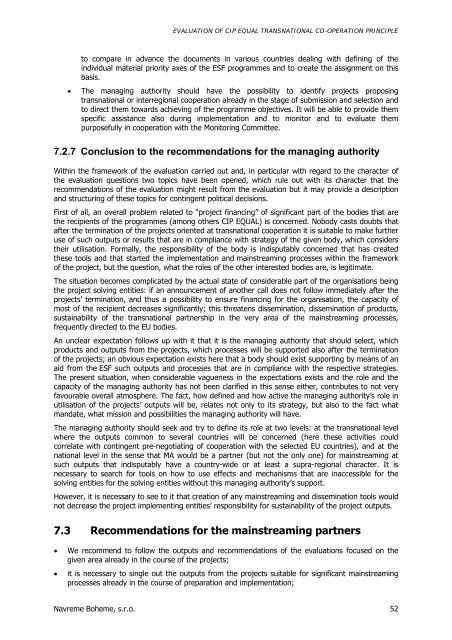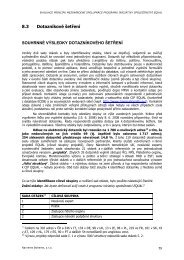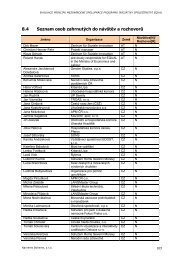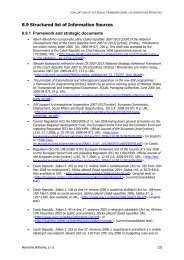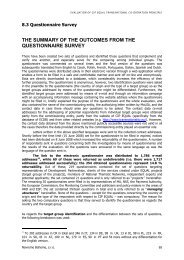EQUAL - Final report - eng - navreme
EQUAL - Final report - eng - navreme
EQUAL - Final report - eng - navreme
Create successful ePaper yourself
Turn your PDF publications into a flip-book with our unique Google optimized e-Paper software.
EVALUATION OF CIP <strong>EQUAL</strong> TRANSNATIONAL CO-OPERATION PRINCIPLE<br />
to compare in advance the documents in various countries dealing with defining of the<br />
individual material priority axes of the ESF programmes and to create the assignment on this<br />
basis.<br />
• The managing authority should have the possibility to identify projects proposing<br />
transnational or interregional cooperation already in the stage of submission and selection and<br />
to direct them towards achieving of the programme objectives. It will be able to provide them<br />
specific assistance also during implementation and to monitor and to evaluate them<br />
purposefully in cooperation with the Monitoring Committee.<br />
7.2.7 Conclusion to the recommendations for the managing authority<br />
Within the framework of the evaluation carried out and, in particular with regard to the character of<br />
the evaluation questions two topics have been opened, which rule out with its character that the<br />
recommendations of the evaluation might result from the evaluation but it may provide a description<br />
and structuring of these topics for contingent political decisions.<br />
First of all, an overall problem related to “project financing” of significant part of the bodies that are<br />
the recipients of the programmes (among others CIP <strong>EQUAL</strong>) is concerned. Nobody casts doubts that<br />
after the termination of the projects oriented at transnational cooperation it is suitable to make further<br />
use of such outputs or results that are in compliance with strategy of the given body, which considers<br />
their utilisation. Formally, the responsibility of the body is indisputably concerned that has created<br />
these tools and that started the implementation and mainstreaming processes within the framework<br />
of the project, but the question, what the roles of the other interested bodies are, is legitimate.<br />
The situation becomes complicated by the actual state of considerable part of the organisations being<br />
the project solving entities: if an announcement of another call does not follow immediately after the<br />
projects’ termination, and thus a possibility to ensure financing for the organisation, the capacity of<br />
most of the recipient decreases significantly; this threatens dissemination, dissemination of products,<br />
sustainability of the transnational partnership in the very area of the mainstreaming processes,<br />
frequently directed to the EU bodies.<br />
An unclear expectation follows up with it that it is the managing authority that should select, which<br />
products and outputs from the projects, which processes will be supported also after the termination<br />
of the projects; an obvious expectation exists here that a body should exist supporting by means of an<br />
aid from the ESF such outputs and processes that are in compliance with the respective strategies.<br />
The present situation, when considerable vagueness in the expectations exists and the role and the<br />
capacity of the managing authority has not been clarified in this sense either, contributes to not very<br />
favourable overall atmosphere. The fact, how defined and how active the managing authority’s role in<br />
utilisation of the projects’ outputs will be, relates not only to its strategy, but also to the fact what<br />
mandate, what mission and possibilities the managing authority will have.<br />
The managing authority should seek and try to define its role at two levels: at the transnational level<br />
where the outputs common to several countries will be concerned (here these activities could<br />
correlate with contingent pre-negotiating of cooperation with the selected EU countries), and at the<br />
national level in the sense that MA would be a partner (but not the only one) for mainstreaming at<br />
such outputs that indisputably have a country-wide or at least a supra-regional character. It is<br />
necessary to search for tools on how to use effects and mechanisms that are inaccessible for the<br />
solving entities for the solving entities without this managing authority’s support.<br />
However, it is necessary to see to it that creation of any mainstreaming and dissemination tools would<br />
not decrease the project implementing entities’ responsibility for sustainability of the project outputs.<br />
7.3 Recommendations for the mainstreaming partners<br />
• We recommend to follow the outputs and recommendations of the evaluations focused on the<br />
given area already in the course of the projects;<br />
• it is necessary to single out the outputs from the projects suitable for significant mainstreaming<br />
processes already in the course of preparation and implementation;<br />
Navreme Boheme, s.r.o. 52


